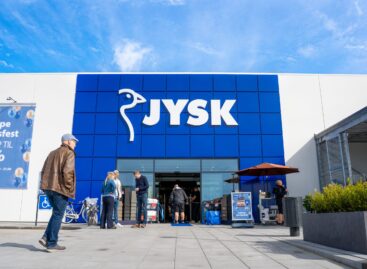According to a study, e-mobility is also expanding in domestic transport
The greening of freight transport is inevitable, and the proportion of e-vehicles in Hungarian logistics will increase in the next five years, according to industry research commissioned by Siemens.
 The research covering 150 companies reveals that domestic industry players themselves have declared themselves committed to sustainable operation: every second of them regulates their carbon dioxide emissions, and several use solar power plants for renewable energy production. However, they have little information and the human resources to manage the transition, so for many at the moment the switch would only be an extra task, which should pay off from the economic side as well.
The research covering 150 companies reveals that domestic industry players themselves have declared themselves committed to sustainable operation: every second of them regulates their carbon dioxide emissions, and several use solar power plants for renewable energy production. However, they have little information and the human resources to manage the transition, so for many at the moment the switch would only be an extra task, which should pay off from the economic side as well.
Balasa Levente, head of Siemens Zrt.’s Smart Infrastructure business, said in the announcement: although there are already logistics companies undertaking green delivery, most of the companies involved are still waiting for development. Big changes will almost certainly come in the next few years, more and more e-vans will appear in the field of urban goods transport. For this, the companies will very soon need the development of the charging infrastructure, its efficient operation, as well as service solutions, he added.
Nearly a tenth of the companies participating in the survey use electric vehicles, and these are mainly present in the company car fleet, in the administrative fleet or in the movement of goods within the plant. At the same time, the expected growth is clearly indicated by the fact that 20 percent of the companies have definite development ideas concerning e-mobility, and every second company among them plans to implement it within three years.
State subsidies can strengthen e-mobility development plans. Half of the companies with financial obstacles to the transition stated that they would consider the development if they received adequate support. The size of this was indicated by the respondents as two-thirds of the system construction cost.
In addition to sustainability commitments, the fact that several people have reported that they cannot fully utilize the electricity produced by their solar power plants and which cannot be fed back into the public grid can also motivate companies to develop. The e-charging infrastructure could be a step forward in this, especially when combined with a technology like the microgrid.
Related news
Cheese-cocoa-peach jam: these are the most popular cookie flavors
🎧 Hallgasd a cikket: Lejátszás Szünet Folytatás Leállítás Nyelv: Auto…
Read more >Hungarians don’t replace their furniture – JYSK research reveals a conscious, long-term planning market
🎧 Hallgasd a cikket: Lejátszás Szünet Folytatás Leállítás Nyelv: Auto…
Read more >Related news
How does the forint exchange rate affect consumer prices?
🎧 Hallgasd a cikket: Lejátszás Szünet Folytatás Leállítás Nyelv: Auto…
Read more >HELL CITY has arrived, led by Michele Morrone
🎧 Hallgasd a cikket: Lejátszás Szünet Folytatás Leállítás Nyelv: Auto…
Read more >Two million people have already voted, so 57 million forints will be given to locals in 125 settlements, courtesy of Tesco
🎧 Hallgasd a cikket: Lejátszás Szünet Folytatás Leállítás Nyelv: Auto…
Read more >








